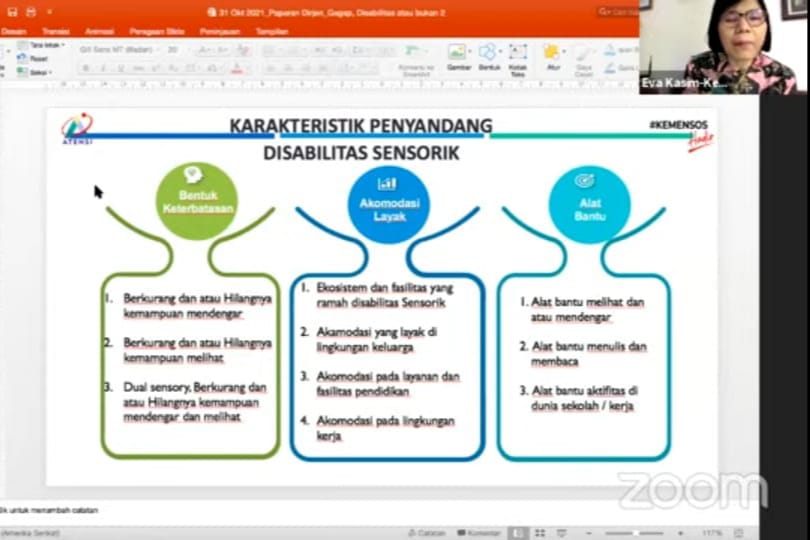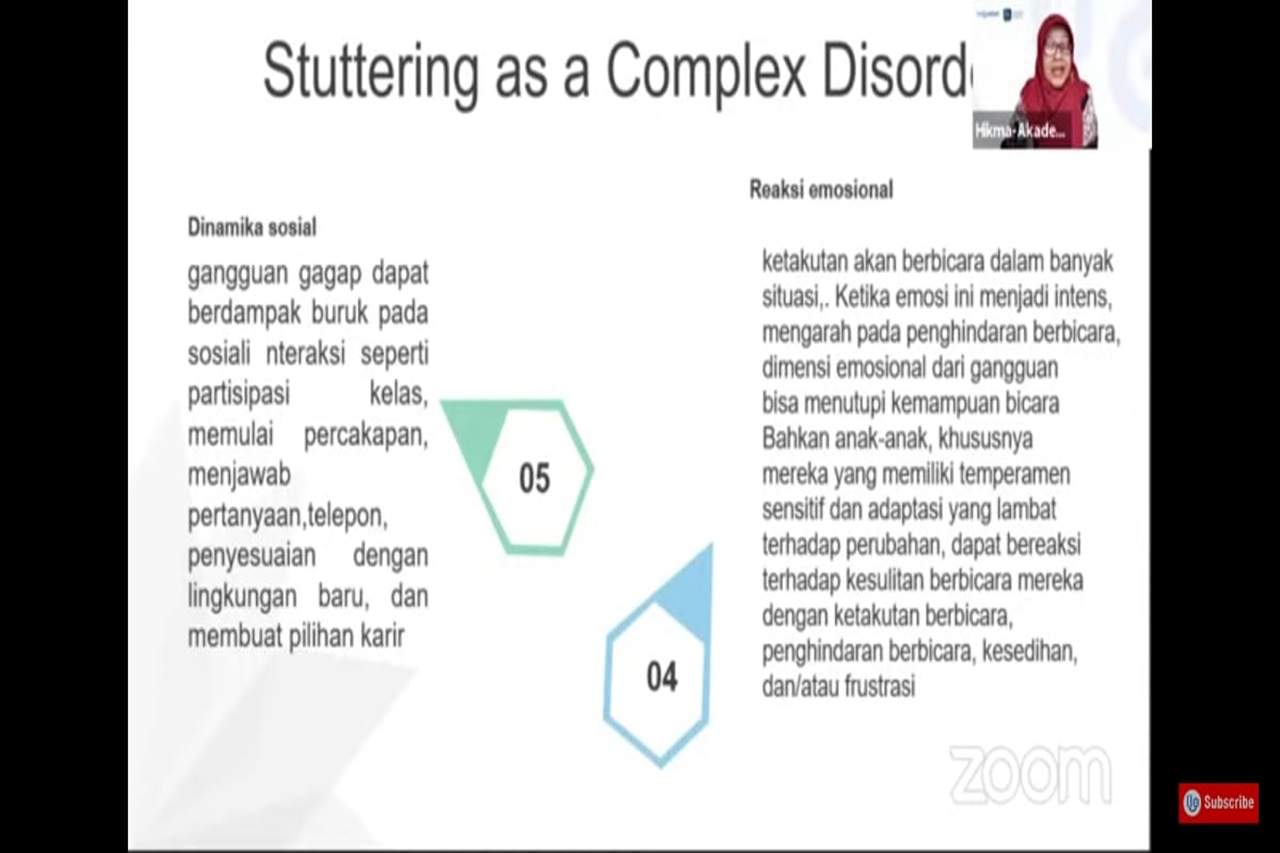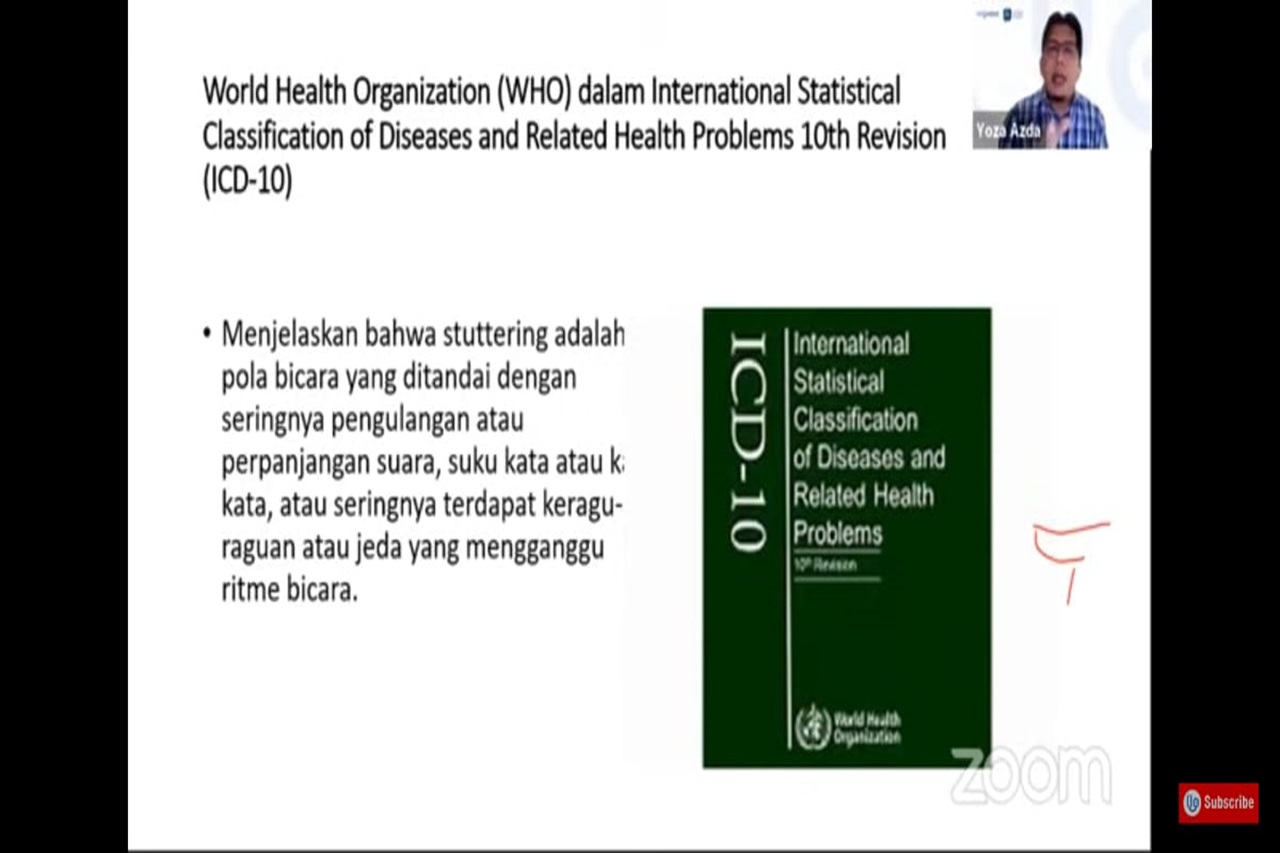People with Stuttering are Entitled to Get ATENSI Service
Writer :
Humas Ditjen Rehabilitasi Sosial
Translator :
Karlina Irsalyana
JAKARTA
(October 31, 2021) - Secretary General of the Ministry of Social
Affairs Harry Hikmat, represented by the Director of Social Rehabilitation for
Persons with Disabilities, Eva Rahmi Kasim attended a webinar organized by
Hellosehat and the Indonesian Stuttering Community (ISC) which will discuss a
theme entitled Pros and Cons of Stuttering as a Disability.
Indonesia
Stuttering Community (ISC), this community is the largest forum for people with
stuttering, ISC activities around education related to stuttering, to
create an Indonesian society that is inclusive and friendly to stuttering, and
further increases public knowledge about stuttering.
The Director
of Social Rehabilitation for Persons with Disabilities, Eva Rahmi Kasim said
that Persons with Disabilities are part of Indonesia's large population. Based
on the National Socio-Economic Survey (SUSENAS, 2020) there are around 22
million more Indonesians with disabilities.
Law No. 8 of
2016 Article 1 stated that any person who experiences physical, intellectual,
mental, and/or sensory limitations in the long term who is interacting with the
environment may experience obstacles and difficulties to participate fully and
effectively with other citizens based on equal rights.
Law No. 8
of 2016 Article 4 Paragraph 1 Letter d stated that "Persons with Sensory
Disabilities" are disturbances in one of the functions of the five senses,
including visual and/or speech disability. In the elucidation of Article 4
Paragraph 2, what is meant by "for a long period" is at least 6 (six) months and/or permanent.
Based on the
Regulation of the Minister of Health No. 81 of 2014 on Standards of Speech
Therapy Services, Stuttering is characterized by a fluency when speaking that
is not following the age of the speaker and this disfluency affects
the rhythm, the average number of words produced when speaking and creates a
strong effort from the speaker to be able to speak fluently.
The role of
the Ministry of Social Affairs through the Social Rehabilitation Assistance
(ATENSI), persons with sensory disabilities can get direct community, family, and residential-based services that are carried out at the rehabilitation
center belonging to the Ministry of Social Affairs. The services provided are
in the form of supporting the fulfillment of decent living needs such as
clothing and food.
Furthermore,
social care and/or child care, family support, physical therapy, psychosocial
therapy, and mental-spiritual therapy, vocational training and/or
entrepreneurship coaching, social assistance, and accessibility support.
To deal with stuttering
requires proper accommodation in the family environment, education, and also
access to work. The management of stuttering is expected to be holistic, not
just medically, but also for a good quality of life. People with stuttering have
the right to receive social rehabilitation services through ATENSI at social rehabilitation
centers of the Ministry of Social Affairs.
Hikmatun
Sadiah as a speech therapist said that stuttering is a communication disorder
in the form of fluency "because when you experience stuttering, the
fluency of speech will be disturbed in rhythm, prosody, and speed of
speech," explained Hikmatun Sadiah.
According
to the World Health Organization (WHO), Stuttering is a speech rhythm disorder
in which the individual knows exactly what wants to say, but at that time
cannot say it due to repetition, prolongation, and stopping.
Hikmatun
Sadiah also said that stuttering is caused by multiple factors, it can be
internal and external. Internal factors include heredity, temperament, cognitive
abilities, language skills, information processing mechanisms (attention,
perception, memory, and reasoning), and speech motor control.
While
external conditions include culture, parental expectations, parenting
practices, educational experiences, and relationships with siblings and peers.
A
psychologist, Yoza Azda also had the opportunity to explain about stuttering,
signs of stuttering, namely repetition of sounds or syllables, the extension of
vowels and consonants, interrupted words, silence or pauses in speaking, long
words to replace words problems, there appears to be physical pressure when
saying words.
Factors
that cause stuttering are also mentioned including genetics, about 60% of those
who stutter have family members who stutter; child development, children with
problems or delays in language development, and other speech disorders are more
likely to stutter.
In
addition, other causative factors are neurophysiology, neurological research
shows that people who stutter have speech and language processes slightly
different from those who are not stuttering, and family dynamics. Stuttering
can occur when a combination of factors come together and each person may have
a different cause.
"Stuttering
therapy can be a method that can be done, not stuttering when talking alone and
singing, and condition it by thinking that 'I don't stutter' can help speak
fluently", explained Yoza Azda.
In
closing, Yoza said, it is hoped that friends who join this community will
support each other and live life cheerfully so that they can be creative and
innovate.
This
webinar was also attended by members of the Indonesian Stuttering Community and
Medical Editor Hellosehat as well as students of the Speech Therapy Academy.
 English
English
 Bahasa
Bahasa




